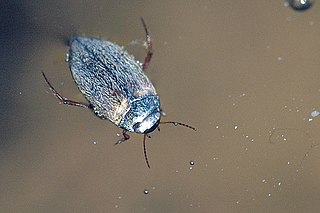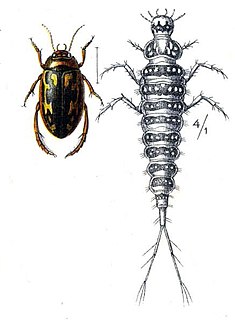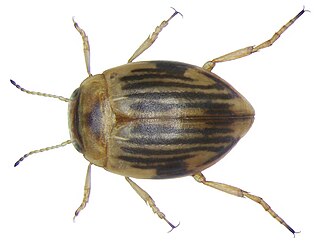
The Dytiscidae – based on the Greek dytikos (δυτικός), "able to dive" – are the predaceous diving beetles, a family of water beetles. They occur in virtually any freshwater habitat around the world, but a few species live among leaf litter. The adults of most are between 1 and 2.5 cm (0.4–1.0 in) long, though much variation is seen between species. The European Dytiscus latissimus and Brazilian Megadytes ducalis are the largest, reaching up to 4.5 cm (1.8 in) and 4.75 cm (1.9 in) respectively. In contrast, the smallest is likely the Australian Limbodessus atypicali of subterranean waters, which only is about 0.9 mm (0.035 in) long. Most are dark brown, blackish, or dark olive in color with golden highlights in some subfamilies. The larvae are commonly known as water tigers due to their voracious appetite. They have short, but sharp mandibles and immediately upon biting, they deliver digestive enzymes into prey to suck their liquefied remains. The family includes more than 4,000 described species in numerous genera.

Hygrotus is a genus of beetle in family Dytiscidae. It contains two subgenera and about 70 species, including:

Rhantus is a genus of beetle in family Dytiscidae. There are about 100 species distributed worldwide. They often live in pools and marshy habitat types. Several species have colonized oceanic islands and become endemics.

Agabus is a large genus of predatory aquatic beetles in the family Dytiscidae, proposed in 1817 by William Elford Leach and named after Agabus, an early follower of Christianity. The adult beetles are moderate-sized, 5 to 14 mm long. The genus is primarily Holarctic in distribution, with only a few species known from the Afrotropic and Neotropic realms. Three species of Agabus, namely A. clypealis, A. discicollis and A. hozgargantae are endangered according to the IUCN Red List. The division into subgenera is not widely accepted. However, a number of species groups are recognized after the works of David J. Larson and Anders N. Nilsson. The genus is probably polyphyletic or paraphyletic. In a recent study of mitochondrial DNA, Agabus was found paraphyletic with respect to several of the species groups of Platambus, a closely related genus in the tribe Agabini. Lately the taxonomy of the genus has been revised, and some groups of species were transferred from Agabussensu stricto to other genera in the tribe Agabini.

Ilybius is a large genus of predatory aquatic beetles in the family Dytiscidae. The genus is native to the Palearctic, the Near East, the Nearctic, and North Africa. 70 species has been described from this genus:

Hydroporus is a genus of water beetles native to the Palearctic, the Nearctic, the Near East, and North Africa. It contains the following species:

Platambus is a genus of beetle native to the Palearctic, including Europe, the Near East and North Africa. It distinguished by a wide epipleuron. The ventral surface has spot markings.

Cybister, is a genus of beetle in family Dytiscidae native to the Old World, North America, and Australia, but has a worldwide distribution. There are approximately 80 species in the genus.
Ilybiosoma is a genus of beetles in the family Dytiscidae, containing the following species:

Hydroglyphus is a genus of beetles in the family Dytiscidae, containing the following species:
Neoclypeodytes is a genus of beetles in the family Dytiscidae, containing the following species:
Uvarus is a genus of beetles in the family Dytiscidae, containing the following species:
Heterosternuta is a genus of beetles in the family Dytiscidae, containing the following species:

Megaporus is a genus of beetles in the family Dytiscidae, containing the following species:

Nebrioporus is a genus of beetles in the family Dytiscidae, containing the following species:

Oreodytes is a genus of beetles in the family Dytiscidae, containing the following species:

Sanfilippodytes is a genus of beetles in the family Dytiscidae, containing the following species:

Sternopriscus is a genus of beetles in the family Dytiscidae, containing the following species:
Desmopachria is a genus of beetles in the family Dytiscidae, containing the following species:

Boreonectes is a genus of predaceous diving beetles in the family Dytiscidae. There are about 16 described species in Boreonectes. They are found in North America, the Neotropics, and the Palearctic.















